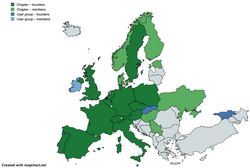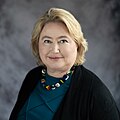Wikimedia Europe
| Wikimedia Europe | |
|---|---|
 Wikimedia Europe logo | |
 Członkowie Wikimedia Europe | |
| Location | Brussels, Belgium & remote |
| Affiliate code | WMEU |
| Country code | EU |
| Legal status | Association internationale sans but lucratif (AISBL) |
| Founding date |
|
| Main office | Region Stołeczny Brukseli |
| Membership | 27 (lista członków) |
| Staff | 10 |
| Official language(s) | angielski |
| Other language(s) | francuski, niderlandzki |
| President | Claudia Garád |
| Secretary | Maciej Artur Nadzikiewicz |
| Treasurer | Capucine-Marin Dubroca-Voisin |
| Board members | |
| Key people |
|
| Incorporation paper | Statutes |
| Budget | 542 000 EUR (2024) |
| Reports | Reports |
| Affiliations | |
| Mailing list | updates |
| Remarks | Board resolutions |
Członkowie-założyciele Wikimedia Europe
20 lipca, na spotkaniu organizacji afilianckich Wikimedia, przedstawiciele potwierdzili zobowiązanie swoich organizacji do założenia Wikimedia Europe. Na dzień 19 sierpnia 2022 roku członkami Wikimedia Europe są:
Chaptery
- Wikimedia Belgium
- Wikimedia Czech Republic
- Wikimedia CH
- Wikimedia Deutschland
- Wikimedia Danmark
- Wikimedia España
- Wikimedia Eesti
- Wikimédia France
- Wikimédia Magyarország
- Wikimedia Italia
- Wikimedia Nederland
- Wikimedia Norge
- Wikimedia Austria
- Wikimedia Polska
- Wikimedia Portugal
- Wikimedia Serbia
- Wikimedia Suomi
- Wikimedia Szwecja
- Wikimedia UK
- Wikimedia Ukraina
Organizacje tematyczne
Grupy użytkowników
- Grupa Użytkowników Baskijskich Wikimedystów
- WikiDonne
- Esperanto kaj Libera Scio
- Wikimedia Community User Group Georgia
- Wikimedia Community Ireland
- Wikimedia Community User Group Malta
- Wikimedians of Slovakia
- Wikimedia Community User Group Turkey
Board and Staff
Board
| Photo | Name | Wikimedia username | Seat | Term | Role | Affiliation |
|---|---|---|---|---|---|---|

|
Claudia Garád | Elected
|
2022–2025[1]
|
President
|
Wikimedia Austria | |

|
Maciej Artur Nadzikiewicz | Elected
|
Secretary
|
Wikimedia Poland | ||

|
Capucine-Marin Dubroca-Voisin |
Elected
|
Treasurer
|
Wikimedia France | ||

|
Rebecca MacKinnon | Appointed
(22 Aug 2022) |
Member
|
N/A | ||

|
Gonçalo Themudo | Elected
|
Wikimedia Portugal |
Staff
- Dimi Dimitrov – Policy Director
- Anna Mazgal – Executive Director
- Michele Failla – Senior EU Law & Policy Advisor
- Valentina Calcagno – Fundraising Manager
- Erkida Pema – Finance and Operations Officer
General Assembly
- 2023:
- Jan 27, 2023 2023 WMEU Online General Assembly.
- June 9-10, 2023 2023 WMEU General Assembly in Prague.
- 2024:
- Jan 26, 2024 2024 WMEU Online General Assembly.
- May 24-25, 2024 2024 WMEU General Assembly in Prague.
Informacje dla przyszłych członków
Information for newcomers
Stworzyliśmy prezentację, aby poinformować potencjalnych przyszłych członków o naszej organizacji.

Jeśli chcesz dołączyć do Wikimedia Europe, skontaktuj się z Anną Mazgal (anna@wikimedia.be)
Founding documents
- Statutes – our founding document is available here
- Trademark – our agreement with WMF is available here.
Reports and plans
- Reports:
- Financial reports:
- Budget plans:
- Work plans:
Stay updated!
You can join the following mailing lists to get updates from us:
Updates (updates![]() wikimedia-europe
wikimedia-europe![]() eu) – this is a list of all news related to Wikimedia Europe, our meetings, organisational matters and Board activity. The people receiving those emails are both official representatives of their organisations to WMEU and other people from those organisations and groups who wish to be informed about Wikimedia Europe's internal affairs. If you or anybody else from your organisation would like to be there – let us know and we will make that happen[2][3].
eu) – this is a list of all news related to Wikimedia Europe, our meetings, organisational matters and Board activity. The people receiving those emails are both official representatives of their organisations to WMEU and other people from those organisations and groups who wish to be informed about Wikimedia Europe's internal affairs. If you or anybody else from your organisation would like to be there – let us know and we will make that happen[2][3].
Public policy list (publicpolicy![]() lists
lists![]() wikimedia
wikimedia![]() org) – this is a public list to share policy updates, look for experiences and perspectives in general policy and advocacy questions – both by us in Brussels and our subscribers. The subscribers are policy and advocacy experts, enthusiasts and followers from Wikimedia and other organisations, including EU institutions, media and entities we sometimes get on opposite positions in policy debates with. It has a moderate amount of traffic and serves to share a much-praised monthly digest on Brussels policy prepared by Dimi[4][5][6].
org) – this is a public list to share policy updates, look for experiences and perspectives in general policy and advocacy questions – both by us in Brussels and our subscribers. The subscribers are policy and advocacy experts, enthusiasts and followers from Wikimedia and other organisations, including EU institutions, media and entities we sometimes get on opposite positions in policy debates with. It has a moderate amount of traffic and serves to share a much-praised monthly digest on Brussels policy prepared by Dimi[4][5][6].
Zobacz też
All documentation can be found here:
- EU policy qualitative report
- EU policy – structural implications focus group report
- EU policy – strategic direction and 2030 Movement Strategy
Disclaimers
Uwagi
- ↑ The 2-year Board term runs from the official incorporation of the organisation in January 2023
- ↑ Confidentiality level: unless the author of a message specifies differently (for example for data protection purposes), you are free to forward these messages to your colleagues, board and members of your organisation.
- ↑ People not added to the group can't post to its members.
- ↑ Confidentiality level: the list has a searchable public archive, so it is not suitable for passing on confidential information. You are free to forward these messages to anyone, within and outside your organisation.
- ↑ People not added to the list can't post to its members.
- ↑ Anybody can sign up, upon admin approval.
